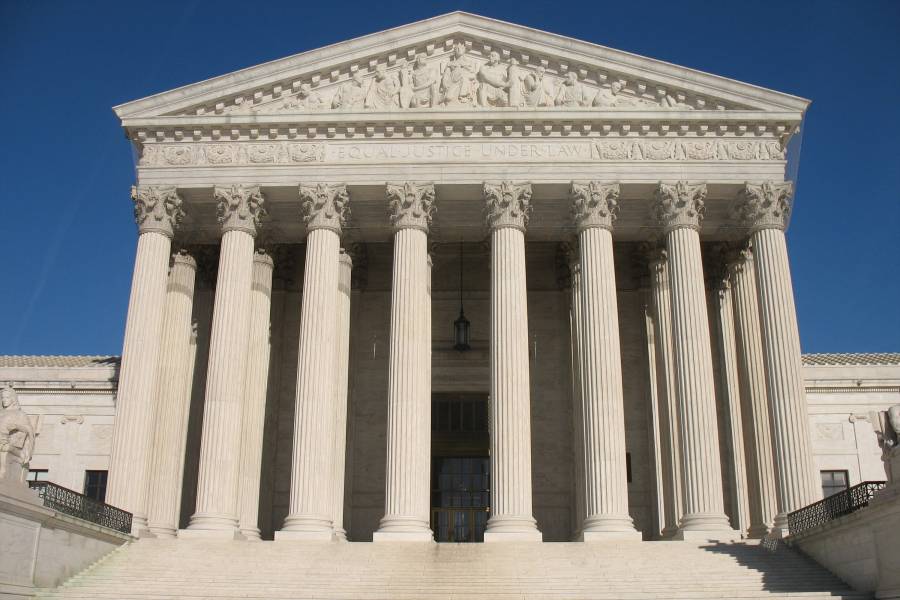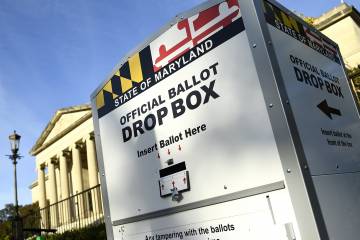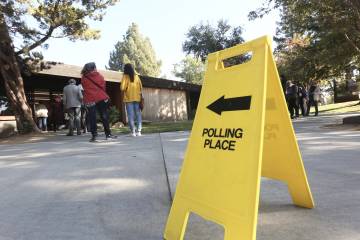The outcome of the 2020 presidential race is very much in the hands of America's voters on this historic Election Day, but behind the scenes, both sides are preparing for the possibility that the next president may ultimately be chosen by the courts. President Trump, in particular, has made no secret of his willingness to turn to the judicial branch for a decisive edge in key swing states, questioning the legitimacy of mail-in voting and stating earlier this week that as soon as the voting ends, "we're going in with our lawyers."
Over the past week, the Supreme Court has made a handful of pre-election rulings—allowing extended vote-counting in Pennsylvania and North Carolina, but not in Wisconsin—that largely preserves the status quo. But the language and nuances of those decisions may have laid the groundwork for a more conservative view of expanded voting in future election cases, including those that could come before the court in the days and weeks ahead.
For a closer look at the role the courts play in U.S. elections, as well as the outsized role they might play in 2020, the Hub spoke with Steven Schneebaum, an expert in constitutional law and interim director of the International Law and Organizations Program at the Johns Hopkins School of Advanced International Studies. Schneebaum discussed the Supreme Court's pre-election decisions and what they might tell us, the legacy of the Bush v. Gore case in 2000, and why a determinative intervention by the Supreme Court in this election might be much more problematic.
What are the chances that the federal judiciary plays some significant role in the outcome of this presidential election? Walk us through those scenarios—what does that look like?
Well, obviously this is dealing in prediction and speculation. But when the Pennsylvania case came before the Supreme Court the other day, and the Court allowed the extension of the deadline for absentee votes to be received, Justice Alito wrote a concurrence in which he said "We're not finished with this case—there is a serious constitutional question here, and we may need to come back and resolve it." If they come back and resolve it, obviously that will be after Election Day. And so at that point, the question will be whether some votes that have been cast and have been counted should be tossed. And that, I think, would be a very hard sell to the American people, for voters who've followed what they believed in good faith to be the rules—in fact, what the courts had told them were the rules—to see their votes suddenly discounted or disallowed on the basis of a post-election interpretation. That's a scary prospect, and I'm not sure that that would go down well. But that's one way that this could happen.
Another way, of course, would be that if there are states that are close in their vote count, and the outcomes depend on, say, absentee ballots. And let's say that the rules, for some reason, were recently changed by either the state legislature or a state agency, or even the state courts. Then conceivably the federal courts could, I guess, determine that those state decisions that permitted the counting of those votes were erroneous or unconstitutional or somehow not right. And then those votes could be disallowed.
But it's one thing when the Supreme Court said in 2000 that Florida has to stop the recount, they have to freeze the situation in place right now and base their electoral allocation—which in this case went to then-Gov. Bush—entirely on the counts that had already taken place. We didn't know what would have happened had the rest of the votes been counted. It's conceivable that Bush still would've won. It's conceivable that he wouldn't have. The decision was outcome determinative, but no one knew the outcome prior to the decision.
In a situation where, say, Biden carries North Carolina by a percent or a percent and a half, and there is a judicial challenge to some of the absentee ballots that have been counted, and that may even have determined the outcome … at that point, the courts would be sitting on a powder keg. Because then they would be telling people, "Yes, you voted, and, yes, you followed the rules that were in place on the day that you voted. But we know better, and those rules were wrong. It wasn't your fault. You did what you thought was right. But in fact it wasn't right, and we don't have the discretion to fix it."
There's a distinction to be made there between a judicial decision that stops counting, where we don't know what would happen if we continued, and a judicial decision that overturns a result that we do know—or at least we thought we knew based on the application of rules that were correctly applied at the time that those votes were counted. That's different from Bush v. Gore—that's different from anything we've ever seen. And I think it would not go down well around the country. I think people would say if even a single state shifted—even if didn't change the ultimate Electoral College outcome—that this is not the proper role of courts, this is anti-democratic. Changing the outcome after the votes have been cast and counted is, I think, a bridge way too far.
What is the appropriate role of the courts in an election? And what role are the courts already playing in this election in particular?
Voting is a very key part of democratic entitlement, and if there were to be an effort to suppress votes that did constitute something unconstitutional, we would want, I think, the judiciary to be able to say, "No, under the principle of one person, one vote; under the constitutional guarantees of equal protection and due process, everybody should have equal chance to determine who the president is."
So if there were to be a systematic denial of those rights—perhaps by state law, or perhaps by some administrative determination within states—I think we want the judiciary to play the role that it has always played, to be the guardian of constitutional protections.
But it's curious that the courts, including the Supreme Court, have been willing to engage in analyses of state constitutions to determine whether state electoral procedures conform to state constitutions. Theoretically, state courts ought to be the final interpreters of exactly what is consistent and inconsistent with the constitutions in those cases. And yet some members of the Supreme Court—at least the current court—have ignored that principle. Justice Kavanaugh, for example, in his concurring opinion in the case from Wisconsin last week, said state courts have no role to play here at all because the U.S. Constitution confers final authority for making election rules on state legislations, not state courts.
That's a very bizarre interpretation, it seems to me, because it would suggest that if state legislatures made statutes or rules that authorize the conduct of elections in ways that were inconsistent with the state constitution, there would be no one to catch them—no one to say that's not right, that's not fair, that's not constitutional. Kavanaugh's view appears to be that state legislatures in this context—and presumably beyond this context—have unreviewable discretion to set the rules for Election Day as they please. In making that argument, he relied on a concurring opinion in Bush v. Gore that was written by then-Chief Justice Rehnquist. However, he was speaking for only three of the justices—it wasn't a majority opinion, it wasn't the opinion of the court. It was simply a concurring opinion.
Ever since Marbury v. Madison in 1803, Americans have always counted on the idea that the courts are the determiners of constitutionality—state courts for state constitutions, federal courts for the U.S. Constitution. And that's fine. But at least Kavanaugh seems to be of the view that there's one exception to that principle, and that has to do with elections, just where you would least expect it to be. That's odd. Again, he was speaking only for himself. It was a concurring opinion. And shortly after that, he did not follow through with that analysis in a couple of other emergency petitions that came before the Court. So perhaps it was some sort of an anomaly, some sort of an aberration. But he needs to be watched.
Overall, what do we make of the recent Supreme Court decisions related to state voting procedures? Is there anything that can be gleaned from them? Is there a through line?
I think there is. There have been two types of challenges that have come before the federal courts so far: One asks, are they conforming to state constitutions? It is generally the role of the state courts to apply state constitutions to state laws, including those that set voting procedures. That's one type of case.
And the other type includes cases in which there is a challenge concerning whether the state agency has actually been delegated the authority that it claimed to exercise. That's a classic administrative law question of whether action has been ultra vires, whether the state agency has acted within its legislative authority or whether it's going off on a frolic. That's standard stuff—there are challenges raising ultra vires every day of the week and in courts around the country. But it's unusual that a federal court would concern itself with what is essentially a state administrative law concern. There's just no basis for federal jurisdiction that I can see at all.
So we have that distinction—some cases ask about the role of the judiciary in interpreting state constitutions. At least that has some significance in a broader sense. Other cases simply test whether state law was properly interpreted by electoral commissions. They don't belong in federal court
An alternate scenario—perhaps a more likely scenario—is that the courts really have no meaningful role to play at all, correct?
Yes, I think what we haven't paid attention to is precisely the other side of this nightmare scenario, where the outcome is clear, where there aren't these granular challenges to matching signatures or to polling stations that stayed open too long. Then everybody can stand down after today and we can focus on other things. At least we will be able to say the people have spoken. And it's very important that we be able to say that. It's important to restore some sense of control to the American people, and I think it's also important for our image around the world.
You know, as a practicing lawyer, I always hate to have to say something like this, but I hope there's no roles for lawyers in resolving this election. But I think that is clearly the case here. I think there's a lot riding on this one. The goal is for the president to be the person that the people, not the courts, selected.
Posted in Voices+Opinion, Politics+Society
Tagged election 2020











